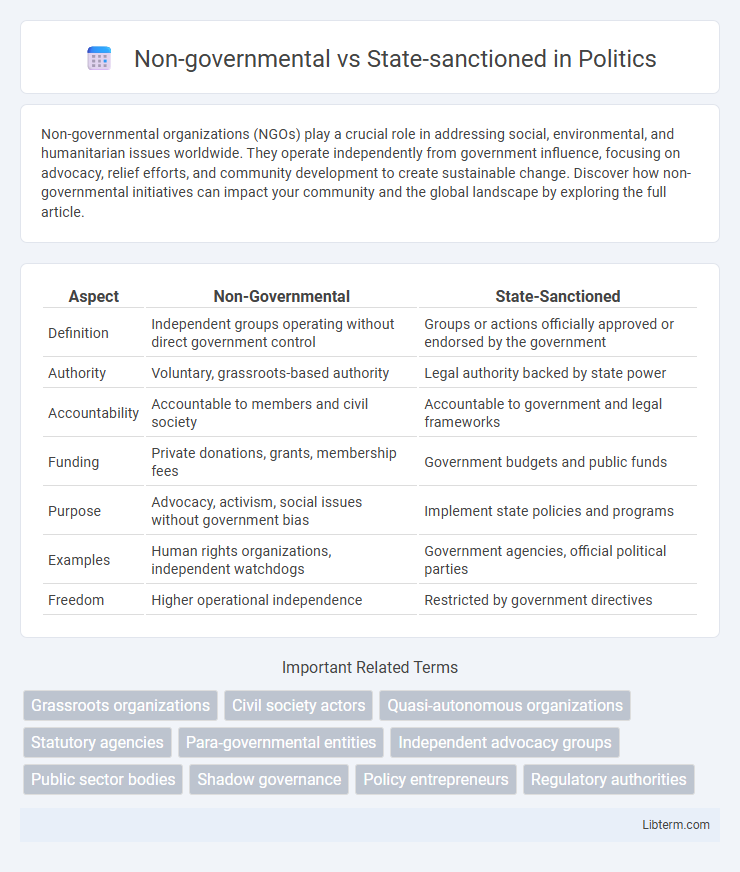Non-governmental organizations (NGOs) play a crucial role in addressing social, environmental, and humanitarian issues worldwide. They operate independently from government influence, focusing on advocacy, relief efforts, and community development to create sustainable change. Discover how non-governmental initiatives can impact your community and the global landscape by exploring the full article.
Table of Comparison
| Aspect | Non-Governmental | State-Sanctioned |
|---|---|---|
| Definition | Independent groups operating without direct government control | Groups or actions officially approved or endorsed by the government |
| Authority | Voluntary, grassroots-based authority | Legal authority backed by state power |
| Accountability | Accountable to members and civil society | Accountable to government and legal frameworks |
| Funding | Private donations, grants, membership fees | Government budgets and public funds |
| Purpose | Advocacy, activism, social issues without government bias | Implement state policies and programs |
| Examples | Human rights organizations, independent watchdogs | Government agencies, official political parties |
| Freedom | Higher operational independence | Restricted by government directives |
Introduction to Non-Governmental and State-Sanctioned Entities
Non-governmental entities operate independently from government control, often focusing on social, environmental, or humanitarian goals, while state-sanctioned entities are authorized and regulated by government authorities to fulfill official roles or provide public services. Non-governmental organizations (NGOs) typically rely on private funding and volunteer support, contrasting with state-sanctioned bodies, which receive government funding and legal mandates. Understanding the distinct governance, funding sources, and operational objectives between these entities is crucial for comprehending their roles in society and public policy implementation.
Defining Non-Governmental Organizations (NGOs)
Non-Governmental Organizations (NGOs) operate independently from government influence, focusing on social, environmental, or humanitarian missions to address issues overlooked by state entities. These organizations rely on private funding, public donations, and volunteer support, enabling impartial advocacy and grassroots mobilization worldwide. NGOs play a critical role in global development, human rights promotion, and disaster relief, often filling gaps left by state-sanctioned institutions.
Understanding State-Sanctioned Organizations
State-sanctioned organizations operate under government authority, possessing legal mandates and resources to implement policies or enforce laws, distinguishing them from non-governmental entities lacking official state endorsement. These organizations often have regulatory power, funding, and operational scope defined by the state, enabling coordinated approaches to public services, security, or economic activities. Understanding this framework clarifies the legitimacy, accountability, and influence state-sanctioned organizations hold in shaping societal structures and governance.
Legal Frameworks Governing Both Sectors
Non-governmental organizations operate under independent legal frameworks that emphasize voluntary association, transparency, and accountability to donors and beneficiaries. State-sanctioned entities function within government-regulated statutes, adhering to policies that prioritize national interests, public accountability, and regulatory compliance. Distinct regulatory mechanisms shape operational scope, funding, and governance structures in both sectors, impacting their legitimacy and effectiveness.
Key Differences: Accountability and Funding
Non-governmental organizations (NGOs) operate independently from state control, relying primarily on private donations, grants, and membership fees, which ensures diverse accountability to donors and the public rather than government directives. State-sanctioned organizations receive funding directly from government budgets, making them accountable to governmental bodies and subject to regulatory oversight and political influence. This fundamental difference in accountability and funding mechanisms shapes their operational priorities, transparency levels, and stakeholder engagement.
Operational Independence: NGO vs. State Actors
Non-governmental organizations (NGOs) typically maintain operational independence by setting their own agendas and managing projects without direct government intervention. State-sanctioned actors operate under government mandates, with activities and objectives closely aligned to state policies and priorities. This distinction impacts the flexibility, accountability, and scope of operations between NGOs and state actors in addressing social and political issues.
Roles in Social and Economic Development
Non-governmental organizations (NGOs) play a crucial role in social and economic development by addressing grassroots issues, fostering community engagement, and providing services where state mechanisms may be limited or absent. State-sanctioned entities, on the other hand, implement large-scale policies and infrastructure projects, leveraging governmental authority and resources to drive national development agendas. Both sectors complement each other, with NGOs often filling gaps left by state programs and contributing to policy advocacy and accountability.
Challenges Faced by NGOs and State-Sanctioned Bodies
Non-governmental organizations (NGOs) face challenges such as limited funding, political interference, and restricted access to conflict zones, which hinder their ability to operate effectively. State-sanctioned bodies often struggle with bureaucratic inefficiencies, corruption, and balancing public accountability with political agendas that can compromise service delivery. Both entities encounter difficulties in maintaining transparency and trust while addressing complex social and humanitarian issues in volatile environments.
Impact Assessment: Effectiveness of Each Approach
Non-governmental impact assessments often provide unbiased and transparent evaluations due to independence from political influence, enhancing credibility and stakeholder trust. State-sanctioned assessments benefit from official access to extensive data and enforcement power but may face restrictions in objectivity and public perception of bias. Effectiveness depends on transparency, methodological rigor, and the ability to influence policy decisions, with non-governmental assessments excelling in advocacy and state-sanctioned ones excelling in regulatory compliance.
Future Trends and Evolving Collaborations
Future trends in non-governmental versus state-sanctioned initiatives highlight increasing hybrid collaborations leveraging technology and shared expertise. Emerging frameworks emphasize adaptive governance models where NGOs and governments co-create policy solutions, enhancing social impact and resource efficiency. Data-driven partnerships and decentralized platforms will drive transparency and scalability in addressing global challenges.
Non-governmental Infographic

 libterm.com
libterm.com